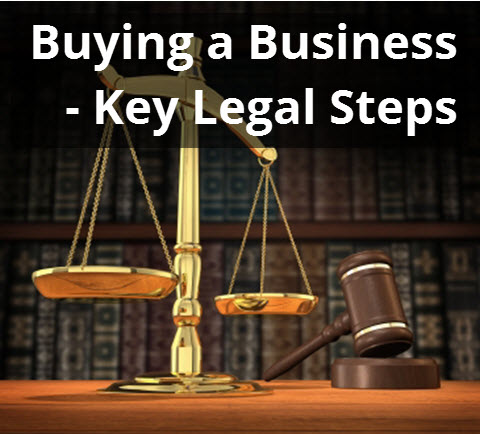
Buying a business is often perceived as a less risky option than starting your own business from scratch; however, without proper research, due diligence, and consideration for the key legal steps and potential liabilities involved – it can be a risky path to venture down.
For example, has the previous owner been in compliance with tax law? Is the business adequately insured? What are the terms of the seller’s commercial lease?
These are just a few of the questions that you need to ask as you pursue the purchase of a business. Follow the points below to learn more about the due diligence and legal aspects involved in buying an existing business.
The Due Diligence Phase - Research the Seller’s Business
The first phase of buying a business involves doing your research and identifying the right business (get more tips on this process in SBA’s tips for Doing Research before You Buy a Business). The second phase involves doing your due diligence, where you really poke your nose into the details of the business!
Areas to consider include:
- Business Finances –A seller’s business finances should be thoroughly researched to ensure the business is truly viable and isn’t carrying too much debt. Work with an accountant to review audited financial statements, tax returns going back five years, cash flow and income statements. Find out if there are any outstanding debts, liens, or tardy accounts receivables. Take a close look at sales tax records too; some states will hold the new buyer responsible if the previous owner was delinquent on paying their sales tax.
- Legal Issues –Learn as much as you can about the business's obligations and compliance with legal issues, including details about existing contracts, insurance policies, intellectual property rights, licenses, permits, employee agreements, and commercial leases. (Check, for example, if leases can be transferred to you).
- Employees – Don’t put this off until after the sale, employees can often make or break your business. Instead request to see HR-related documentation, employee records, non-compete agreements, and so on and be sure your lawyer sees them too.
- Business Structure – Each business structure has different legal and tax obligations. For example, corporations are highly regulated and must maintain proper records – check that your seller is in compliance.
Note that most sellers will require interested buyers to sign a confidentiality agreement to ensure that you won't use the information about the seller's business for any purpose other than making the decision to buy.
Determine What you are Buying
Businesses are sold either in their entirety (the entity and any stock in that business) or as assets of the business. Asset-based purchases tend to be favorable to small business owners because the obligations and debt of the target business would be left with the seller. This should be backed up by a written agreement stating the terms of the asset acquisition (remember you don’t need to buy all the assets, only what you need.) You should also check whether licenses, business names and other intellectual property are transferable.
Consider Forming a New Legal Entity
Talk to your lawyer about this one, but it may be advisable to create a new entity that will acquire the assets of your target business. As a general precaution, forming a corporation or an LLC to buy a business will minimize your personal risk for the business's past obligations.
Write Up a Letter of Intent
Once you’ve determined what you are buying and any employees, liabilities, etc. that you are taking on, you should draw up a letter of intent. This is a non-binding agreement outlining what is to be done when the buyer and the seller have generally agreed upon the terms of the transaction.
Negotiate Purchase Terms
SBA has compiled detailed information on buying a business and negotiating the purchase. For example, to help you determine the value of the business or assets that you are buying read: Determining the Value of a Business. Next you’ll need to work with a lawyer to draft and sign the sales agreement, you should also push to get it into escrow as soon as possible to protect you from other buyers.
Bringing on Board Employees
Don’t assume that the employees will automatically be transferred to you. This decision can be made during the negotiation phase. However, if you are obligated by the sales agreement to keep employees on but intend to review headcount and employee costs and contributions after the sale, check with your state law regarding worker protection rules and the amount of calendar notice you need to provide. Read up on Employment Law as it pertains to layoffs and severance payments. If you don’t have one already and take on employees you will need to obtain an Employer Identification Number from the IRS.
Additional Resources






